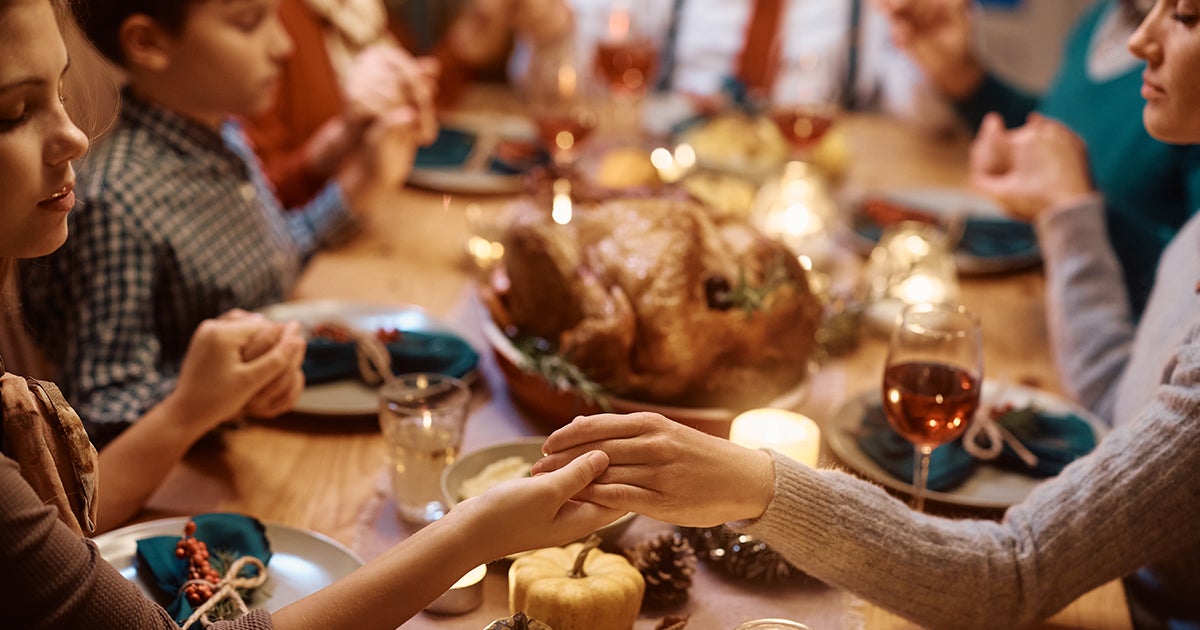
by Jorge Gomez • 4 minutes
Thanksgiving is a special and time-honored tradition for Americans. It’s a time to gather with family and friends to share a delicious meal together (and if we’re honest, some of us tend to overindulge a bit).
Many look forward to the delight of turkey and stuffing, watching a football game while chowing down on some of grandma’s special apple pie or going on a Black Friday shopping spree.
But the significance of the holiday goes much deeper.
Thanksgiving, as its name suggests, is all about gratitude. As a nation, we intentionally set aside a day to give God thanks for all the blessings we have in our lives.
Thanksgiving also brings a sense of perspective. It helps us express gratitude for what makes America unique and exceptional, especially in this increasingly chaotic time when woke culture and the radical Left appear to be more focused on maligning our nation’s heritage and values.
From our economic prowess, to our military strength, and our revered system of justice and laws, there are countless reasons why we can be thankful for living in this great republic.
But there’s one particular blessing that we as Americans often take for granted: religious freedom.
When we look back through our history—dating back to the Pilgrims of Plymouth who held the very first Thanksgiving in 1621—we clearly see the role faith and religious liberty played in the formation and the flourishing of our country.
The Pilgrims we associate with Thanksgiving were religious Separatists—a set of Protestants who felt they’d be unable to reform the Church of England and therefore needed to separate and form their own church. Following persecution from the English monarchy and the state church, they initially took refuge in Holland. Eventually, they made the transatlantic voyage to settle in America.
The Pilgrims are often confused with the Puritans. The latter were those who believed they could reform the Church of England. It turned out that they were wrong, and following severe persecution, some 20,000 followed in the footsteps of the Pilgrims by fleeing to the New World.
It’s true, their motivation to leave their British homeland wasn’t only due to religious oppression. Historians and scholars have extensively documented various reasons for their exodus, ranging from economic, cultural and political upheaval.
Nonetheless, the common thread was religious freedom. They shared a longing to live in liberty, to establish a community where their families could live and worship according to their religious beliefs free of persecution.
The lives of the Pilgrims might appear to be folklore or nostalgic tales of a distant, archaic past. But it’s almost impossible to deny the timeless legacy these early settlers left for our nation.
The first Thanksgiving feast—underpinned by the Pilgrims’ religious conviction to thank God—shows us that religious freedom was, and still is, a vital part of America’s DNA.
The Pilgrims’ search for religious liberty was a precursor to the American Founders who defied the tyranny of the English crown and risked their lives to establish a nation where citizens of any faith, or those of no faith at all, could live peaceably without the heavy hand of government dictating what they should believe.
Indeed, it’s likely our Thanksgiving tradition as we know it today would not exist, had it not been for the courageous settlers who left Europe in search of a place where they could freely live out their faith.
From the landing of the Mayflower in Massachusetts, to the first Thanksgiving festival, to the Founding Era, to the ratification of the U.S. Constitution and the drafting of the Bill of Rights and some of the most important milestones in our nation’s history, there’s been one common thread: religious freedom.
In 1789, Congress passed a resolution asking President George Washington to declare a day specifically dedicated to prayer and thanksgiving.
In October of that year, President Washington issued his Thanksgiving Proclamation, thanking God for bringing our nation into fruition and for the blessing of religious freedom:
“…For the peaceable and rational manner, in which we have been enabled to establish constitutions of government for our safety and happiness, and particularly the national One now lately instituted – for the civil and religious liberty with which we are blessed…”
But the proclamation tradition didn’t end with President Washington.
In 1863, amidst the Civil War and one of the most trying moments for our country, President Abraham Lincoln’s proclamation acknowledged all of the blessings and “gracious gifts of the Most High God,” and inviting Americans to give thanks and praise “to our beneficent Father who dwelleth in the heavens.”
In 1941, President Roosevelt signed a resolution officially establishing the fourth Thursday in November as the Federal Thanksgiving Day holiday. His proclamation read: “Let us reflect at our homes or places of worship on the goodness of God and, in giving thanks, let us pray for a speedy end to strife and the establishment on earth of freedom.”
Presidents throughout American history have encouraged us to have grateful hearts for our liberties, rights, our representative government and the freedom to express and live out our faith. The American Presidency Projects notes that “a consistent feature of Thanksgiving Proclamations throughout is reference to a Supreme Being.”
America’s Thanksgiving Day tradition is inseparable from our country’s founding bedrock of religious liberty. Separating faith and religious freedom from Thanksgiving would be like separating pumpkin from pumpkin pie.
This Thanksgiving, there’s no shortage of people and provisions for which we can be thankful. Let’s be ever grateful that as Americans, we have a constitutionally protected right to freely practice our faith, a true blessing that very few people have around the world.